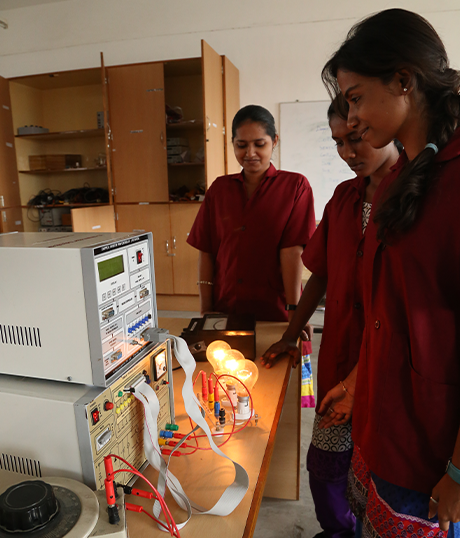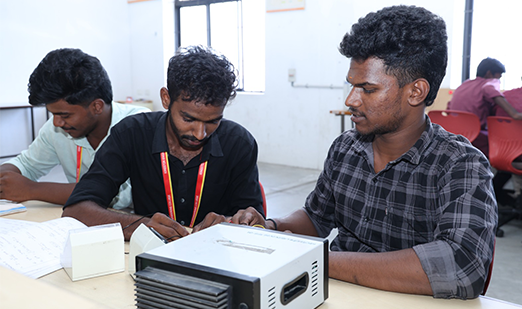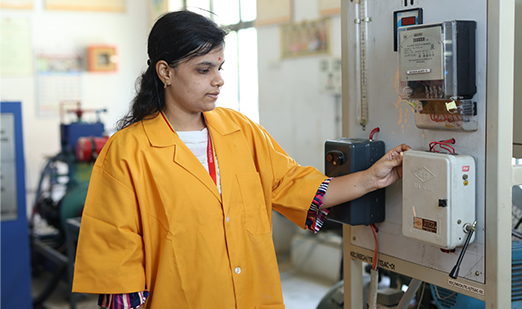Electrical and Electronics Engineering
Department Introduction
The Department of Electrical And Electronics Engineering was started in the year 2008. The annual sanctioned intake of B.E program in Electrical and Electronics Engineering is 120. The department is backed by a team of motivated, dedicated and experienced teachers graduated from institutions of good repute.
Power System had been a thrust area in Electrical Engineering. But with the advent of Power Electronics devices, the contemporary Power System had changed and it took a new phase. Power Electronics has significant role in various phases of Power System. The generation of electric power using alternative/ renewable energy sources has become very popular now a days. With the intention of giving the students to explore deep into the trending areas, the Post Graduate Programme in Power Systems was started in the year 2012 with an annual intake of 18.

| Course | Intake |
|---|---|
| B.E in Electrical And Electronics Engineering | 60 |
| M.E in Power System Engineering | 8 |

Vision Of The Department
- To build highly skilled, competent, ethical and versatile professionals with ability to design, develop, analyze and implement core engineering technologies to solve real time problems

Mission Of The Department
- To Train students to become well-balanced engineers taking into consideration society, safety and the environment
- To make the students suitable for industry.
- To import self-learning ability, and to drive the students for higher education and research.
/B.E. Electrical and Electronics Engineering
- Find employment in Core Electrical and Electronics Engineering and service sectors.
- Get elevated to technical lead position and lead the organization competitively.
- Enter into higher studies leading to post-graduate and research degrees.
- Become a consultant and provide solutions to the practical problems of core organization.
- Become an entrepreneur and be part of electrical and electronics product and service industries.
After going through the four years of study, our Electrical and Electronics Engineering Graduates will exhibit ability to:
- Engineering knowledge: Apply knowledge of mathematics, basic science and engineering science.
- Problem analysis: Identify, formulate and solve engineering problems.
- Design/development of solutions: Design an electrical system or process to improve its performance, satisfying its constraints.
- Conduct investigations of complex problems: Conduct experiments in electrical and electronics systems and interpret the data.
- Modern tool usage: Apply various tools and techniques to improve the efficiency of the system.
- The engineer and society: Conduct themselves to uphold the professional and social obligations.
- Environment and sustainability: Design the system with environment consciousness and sustainable development.
- Ethics: Interacting industry, business and society in a professional and ethical manner.
- Individual and team work: Function in a multidisciplinary team.
- Communication: Proficiency in oral and written Communication.
- Project management and finance: Implement Cost effective and improved system.
- Life-long learning: Continue professional development and learning as a life-long activity.
On completion of Electrical and Electronics Engineering program, the student will have the following Program Specific Outcomes
- Foundation of Electrical Engineering: Ability to understand the principles and working of electrical components, circuits, systems, and control that are forming a part of power generation, transmission, distribution, utilization, conservation, and energy saving. Students can assess the power management, auditing, crisis, and energy saving aspects.
- Foundation of Mathematical Concepts: Ability to apply mathematical methodologies to solve problems related to electrical engineering using appropriate engineering tools and algorithms.
- Computing and Research Ability: Ability to use knowledge in various domains to identify research gaps and hence to provide solutions that lead to new ideas and innovations.
Curriculum and Syllabus
The budding engineers of our department experience practical realization of their theoretical concepts by indulging themselves in the following Workshops and Laboratories of the Department.
- Engineering Practices Laboratory
- Electric Circuits Lab
- Electronics Laboratory
- Electrical Machines Laboratory-I
- Electrical Machines Lab II
- Linear and Digital Integrated
- Circuits Laboratory
- Technical Seminar
- Control and Instrumentation Laboratory
- Professional Communication
- Microprocessors and Microcontrollers Laboratory
- Power System Simulation Laboratory
2016-17:
1. C Srinivasan, K Aruloli, “Design and Implementation of HDMI Transmitter”, International Journal of Engineering Research and Applications, Volume 6, Number 11, 2016, pp. 09-12(4)
1. C Srinivasan, K Aruloli, “Design and Implementation of HDMI Transmitter”, International Journal of Engineering Research and Applications, Volume 6, Number 11, 2016, pp. 09-12(4)
2. S Deepa, B Yuvarani, “ANN based correlate control of non-conventional energy sources and batterie in islanded microgrid”, 2016, 2nd national conference on recent innovations in engineering, technology, management and applications
3. S. Deepa,P. Vanaja Ranjan, B. Thulasi Brindha, N. G. Sowmya, “FPGA based Implementation of Adaptive Notch Filter”, IOSR Journal of Electrical and Electronics Engineering (IOSR-JEEE) , Volume 11, Issue 6 Ver. IV (Nov. –Dec. 2016), PP 88- 90
S Deepa, P Vanaja Ranjan, “Smart monitoring of machine health diagnosis”, Wulfenia (Accepted) (2016)
S Deepa, P Murugesan, C Sharmeela, “A Soft computing technique for characterization of power quality events”, Journal International journal for research in applied science and engineering technology, 2017, Volume 5, Issue 12
2017-18:
1. S Tamilselvi, S Baskar, L Anandapadmanaban, KMA Kadhar, PR Varshini, “Chaosassisted multiobjective evolutionary algorithm to the design of transformer”, Soft Computing 21 (19), 5675-5692-3-2017.
2. S. Jayachitra; G. Baskar; T. Feridinand, “Application of mutation inspired constrained factor PSO considering voltage stability and losses by locating and rating TCSC during N-1 contingency”, International Journal of Reasoning-based Intelligent Systems (IJRIS), Vol. 10, No. 3/4, 2018
2017-18:
1. D.Prabhatharan, S. Deepa, “VLSI implementation of DWT for image compression”, RTEECE’19, SBCEC, Arni on 12.3.2019, pp.213-217.
2019-20:
1. B Thulasi Brindha, T Raghunathan, “Modified PMSG system using Trans Z Source network for grid connected UPFC system”, AICTE sponsored national conference on recent advances in on-board ship automation-RAOBSA 2019, 26th& 27th September 2019 at AMET deemed to be University-Chennai.
Patents
| S.No | Names | Date of Submission | Title | Application Number | Published (Y/N) |
|---|---|---|---|---|---|
| 1 | Dr Halavath Balaji Karnam Sreenu G Prasadu Dr S Deepa N Ramesh Mr Yogesh Mohanrad nigadu Prof Dr SB Chordiya Dr Yashpal Singh | 27.06.2019 | IRSC Machine - Intelligent Rotation Speed Control machine | 201941025655 | Yes |
Proposals Submitted:
AICTE - Research Proposal scheme - Rs 25 Lakhs - 2016-17- An FPGA based Real time fault diagnosis in electrical systems
DST-Women Technology Park for Rs.90 Lakhs in the Academic year 2016-17- Training for rural women to enhance safety and power conservation
Scholars pursuing Research at our Research Centre :
| S.No | Name/Designation of the Scholar | Reg.No | Title | Publications |
|---|---|---|---|---|
| 1 | Mr D Prabhatharan, AP/ECE, Adhiparasakthi College of Engineering, Kalavai | 17144997343/Ph.D/AR7 | Reconfigurable VLSI architecture for image compression | Conference-1 |
| 2 | Mr S Narasimman, AP/EEE, Adhiparasakthi College of Engineering (APCE), Kalavai | 18143991235/Ph.D/AR11 | Torque ripple minimization in BLDC | - |
| 3 | Mr N Ramesh, AP/EEE, Adhiparasakthi College of Engineering , Kalavai | 18234991584/Ph.D/AR11 | Development of instrumentation for smart grid | - |
Research & Development in Electrical Machines Laboratory:
Texmo – Industries have sponsored a submersible motor set to our students for Research & Development purpose.
Rank holders – list
| SI.No | Reg.No | Name of the student | Class | UG/PG |
|---|---|---|---|---|
| 1 | 52409105057 | Vignesh M | FWD | UG |
| 2 | 52409105033 | Preethi M | FWD | UG |
| 3 | 511314105056 | Priyadharshini B | FWD | UG |
| 4 | 51131341117 | Vimalraj M | FWD | UG |
| 5 | 51131341101 | Abinaya R P | FWD | UG |
| S.No | Name of the Faculty | Project Title | Funding Agency | Status |
|---|---|---|---|---|
| 1 | Dr.Rajeswari.Perepi, Mrs.M.Menaka, Mr.M.Tamil Thendral, Ms.S.Sarah, Ms.S.Sivasankari | Innovative Teaching Practices and Methods For Developing Educational Projects In Schools Based on 3D Printing Technology | Kingston Matric Higher Secondary School | Applied |






